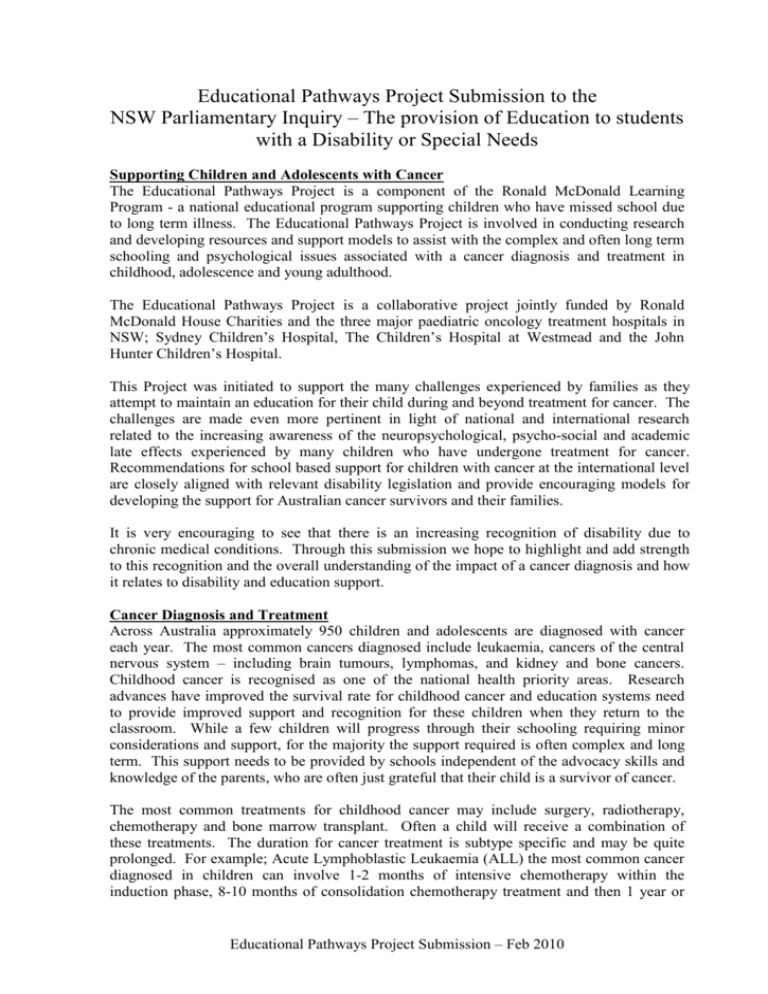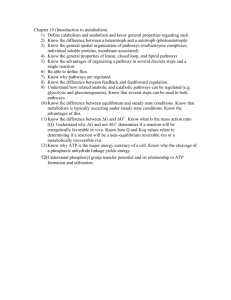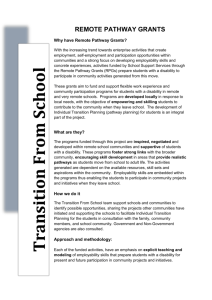The Educational Pathways Project is jointly funded by Ronald
advertisement

Educational Pathways Project Submission to the NSW Parliamentary Inquiry – The provision of Education to students with a Disability or Special Needs Supporting Children and Adolescents with Cancer The Educational Pathways Project is a component of the Ronald McDonald Learning Program - a national educational program supporting children who have missed school due to long term illness. The Educational Pathways Project is involved in conducting research and developing resources and support models to assist with the complex and often long term schooling and psychological issues associated with a cancer diagnosis and treatment in childhood, adolescence and young adulthood. The Educational Pathways Project is a collaborative project jointly funded by Ronald McDonald House Charities and the three major paediatric oncology treatment hospitals in NSW; Sydney Children’s Hospital, The Children’s Hospital at Westmead and the John Hunter Children’s Hospital. This Project was initiated to support the many challenges experienced by families as they attempt to maintain an education for their child during and beyond treatment for cancer. The challenges are made even more pertinent in light of national and international research related to the increasing awareness of the neuropsychological, psycho-social and academic late effects experienced by many children who have undergone treatment for cancer. Recommendations for school based support for children with cancer at the international level are closely aligned with relevant disability legislation and provide encouraging models for developing the support for Australian cancer survivors and their families. It is very encouraging to see that there is an increasing recognition of disability due to chronic medical conditions. Through this submission we hope to highlight and add strength to this recognition and the overall understanding of the impact of a cancer diagnosis and how it relates to disability and education support. Cancer Diagnosis and Treatment Across Australia approximately 950 children and adolescents are diagnosed with cancer each year. The most common cancers diagnosed include leukaemia, cancers of the central nervous system – including brain tumours, lymphomas, and kidney and bone cancers. Childhood cancer is recognised as one of the national health priority areas. Research advances have improved the survival rate for childhood cancer and education systems need to provide improved support and recognition for these children when they return to the classroom. While a few children will progress through their schooling requiring minor considerations and support, for the majority the support required is often complex and long term. This support needs to be provided by schools independent of the advocacy skills and knowledge of the parents, who are often just grateful that their child is a survivor of cancer. The most common treatments for childhood cancer may include surgery, radiotherapy, chemotherapy and bone marrow transplant. Often a child will receive a combination of these treatments. The duration for cancer treatment is subtype specific and may be quite prolonged. For example; Acute Lymphoblastic Leukaemia (ALL) the most common cancer diagnosed in children can involve 1-2 months of intensive chemotherapy within the induction phase, 8-10 months of consolidation chemotherapy treatment and then 1 year or Educational Pathways Project Submission – Feb 2010 more of maintenance chemotherapy treatment. During the induction and consolidation stages a child is generally unlikely to attend school. This is related to the intensity of the treatment as well as the reduced immune status of the child. Even during the maintenance phase and in the years following initial treatment, medical appointments and general health monitoring will impact upon the child’s attendance at school. The appointments are also often long distances from home requiring the child and family to travel to the treating hospital. Late Effects of Cancer Treatment Each of the treatments for cancer will have side effects for the child both in the short term and the long term. Short term side effects include fatigue, vomiting, hair loss, infection etc. It is estimated that up to two thirds of children and adolescents diagnosed with cancer will also experience at least one long term consequence or late effect of their cancer and the associated treatment. Some of the well recognised late effects include: Neurocognitive dysfunction – IQ changes over time, memory, executive function, problem solving, information processing, organisational skills Hearing loss or mobility issues Ongoing fatigue Visual, perceptual and motor function difficulties Attention and concentration difficulties Psychological dysfunction and manifestations including anxiety, depression, post traumatic stress, social isolation, adjustment difficulties, risky behaviours and school absenteeism Within the school environment the physical, social, emotional and cognitive domains of the child are central to their personal and educational development and all of these domains can be affected by the diagnosis and treatment of cancer. The fact that a child may miss up to two years of school means that they miss out on much more than literacy and numeracy skills. They miss the opportunity to participate in school sports, share activities, participate in group discussions and social activities. One of the most common challenges we see in the Ronald McDonald Learning Program is that children lose confidence and interest in school. The Challenges of School Support for a Child with Cancer The acquisition of appropriate school based services and support for a child who has been diagnosed with cancer can be challenging for many reasons. School staff are often unaware of the long term implications of cancer treatment. Communication structures between schools, hospital schools, parents, students and the many multidisciplinary professionals who are involved in cancer treatment can be inconsistent or at worst inadequate. Parents may be reluctant to continue to label their child as a cancer survivor once their child returns to school. The late effects nature of cancer treatment may mean that a student’s difficulties with learning may not manifest fully for several years. The late effects of cancer treatment may be dismissed as issues related to the child and their medical circumstances such as laziness or disinterest rather than being recognised as very real neuropsychological dysfunction which requires structured and ongoing support from the educational professionals. Educational Pathways Project Submission – Feb 2010 Educational Pathways Research With Parents Detailed research involving a comprehensive survey and focus groups was conducted with parents of children, adolescents and young adults who have been diagnosed and treated for cancer in 2009. This research project was conducted across NSW in 2009 and the data is currently in the analysis stage. Preliminary findings indicate that many, many parents are very frustrated at the lack of educational support they receive following the diagnosis of cancer in their child. Many of these frustrations relate to the inability to receive any sort of support for their child because they do not fit the current ‘disability categories’ or ‘boxes’ for funding support and yet their children often have complex and ongoing needs. This situation experienced by so many parents clearly emphasises the need to determine the allocation of funding based on the student’s functioning capacity rather than on a disability label. Following are just a few of the hundreds of comments made by parents regarding educational support for their child. ‘Unfortunately I feel that my son has slipped through the cracks as he is not labelled with any disability, but really he now has a ‘hidden disability’.’ ‘Schools need to have an action plan or policy in place BFORE one of their students is diagnosed with cancer’ ‘I believe that most children need additional education support and also emotional support, especially in the areas of confidence and rebuilding the things they have lost or put on hold during treatment.’ ‘I hope the government takes this issue seriously and supports the needs of all these children.’ ‘My child had difficulty in remembering basic mathematical and grammatical rules.’ ‘We need continued updated information on what services are available to help in the classroom and to make information about these services easier to access.’ ‘Education for teachers on the affects of the cancer treatments.’ Recommendations for School Support International recommendations for school aged children who have been diagnosed with cancer include the following: A comprehensive neuropsychological assessment (More than a standard IQ test by the school counsellor) – reviewed every 2-3 years Individual education plans developed for each child and renewed at least annually for the duration of the school years Classroom accommodations – e.g.: seating, rest breaks, Ongoing assessment task modifications and support – particularly at the senior level. Examination support – special provisions Targeted learning and re-training approaches Individual therapy – e.g.: cognitive behaviour therapy Regular School Counsellor support Homebound education Structured school re-entry programs following hospitalisation Additionally as per the National Disability Strategy Consultation Report (2009), there is a great need for ‘improved teacher training and more targeted professional development’ at both the teacher training level and for existing teachers. Educational Pathways Project Submission – Feb 2010 Advances in the medical profession are keeping children diagnosed with cancer alive. It is to be hoped that our education professionals can now recognise and meet the survival needs of these students within the school environment so that they can live a full and active role as students within our schools and the community. The Educational Pathways Project Committee would welcome the opportunity to further discuss the above mentioned support issues for students with cancer within the context of this valuable inquiry into the provision of education to students with a disability or special needs. Barb Donnan Psychologist Educational Pathways Project Officer Ronald McDonald House Charities On behalf of: The Educational Pathways Committee of Management Professor Glenn Marshall - Senior Paediatric Oncologist – Sydney Children’s Hospital Dr Luce Dalla Pozza – Senior Paediatric Oncologist – The Children’s Hospital at Westmead Dr Frank Alvaro – Senior Paediatric Oncologist – Kaleidoscope – The John Hunter Children’s Hospital Malcolm Coutts – CEO – Ronald McDonald House Charities Tracey Webster – National Ronald McDonald Learning Program Manager Peter Medlock – Parent Representative Jenny Lavoipierre – Parent Representative Donna Lawther – Parent Representative Educational Pathways Project Submission – Feb 2010 Key References Anderson, V. A., Godber, T., Smibert, E., Weiskop, S., & Ekert, H. (2004) Impairments of Attention Following Treatment With Cranial Irradiation and Chemotherapy in Children. Journal of Clinical and Experimental Neuropsychology. 26 (5) pp. 684-697 Armstrong, F. D., & Reaman, G. H. (2005) Psychological Research in Childhood Cancer: The Children’s Oncology Group Perspective. Journal of Pediatric Psychology 30(1) pp. 8997. Butler, R. W., & Mulhearn, R. K. (2005) Neurocognitive Interventions for Children and Adolescents Surviving Cancer. Journal of Pediatric Psychology 30 (1) pp. 65-78. Keene, N. (Ed.) (2003) Educating the Child with cancer: A guide for parents and Teachers. Candlelighters Childhood Cancer Foundation, USA. Nathan, P. C., Patel, S. K., Dilley, K., Goldsby, R., Harvey, J., Jacobsen, C., Kadan-Lottick, N., McKinley, K., Millham, A. K., Moore, I., Okcu, F., Woodman, C. L., Brouwers, P., & Armstrong, F. D. (2007) Guidelines for Identification of, Advocacy for and Intervention in Neurocognitive Problems in Survivors of Childhood Cancer. A Report From the Children’s Oncology Group. Archives Pediatric Adolescent Medicine. 161 (8) pp. 798-806. National People with Disabilities and Carer Council (2009) SHUT OUT: The Experience of People with Disabilities and their Families in Australia National Disability Strategy Consultation Report. Commonwealth of Australia, Canberra, ACT Wiener, L.S, Pao, M., Kazak, AE, Kupst, M.J., Patenaude, A.F., (Eds.) (2009) Quick Reference for Pediatric Oncology Clinicians: The Psychiatric and Psychological Dimensions of Pediatric Cancer Symptom management. Charlottesville, VA: IPOS Press. Educational Pathways Project Submission – Feb 2010





